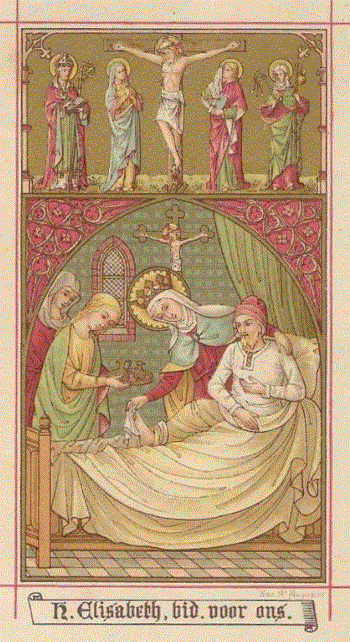“How can I, a wretched creature, continue to wear a crown of earthly dignity, when I see my King Jesus Christ crowned with thorns?” ~St. Elizabeth of Hungary
Saint Elizabeth of Hungary
Widow
(1207-1231)
November 19
Daughter of the King of Hungary, Elizabeth was taken at the age of four to the castle of her future husband, Louis IV, Duke of Thuringia, who was then eleven. The pair grew up together, loved each other deeply, and were married in 1221. During their brief married life, Elizabeth extended her ceaseless charity toward the needy and the sick of the kingdom. After Louis had joined Emperor Frederick II on the Fifth Crusade, he caught the plague at Otranto and died. His uncle drove Elizabeth and her three children from the court in midwinter. After she had suffered great hardships, the Duke’s companions returned from the Crusade and she was restored. Her children provided for, Elizabeth became a Franciscan tertiary. She died at the age of 24.
St. Elizabeth of Hungary on All Saints Day 2010
~~~
St. Elizabeth of Hungary, Landgravine of Hesse and Thuringia
(by Father Francis Xavier Weninger, 1876)
In obedience to her parents, she gave her hand to Louis, Landgrave of Hesse and Thuringia, and lived with him in continual harmony, her conduct being as blameless in the married state as it had been during her maidenhood. She gave one hour every night to prayer, and spent the day in attendance at the divine service in the church, in devout reading and in working for the poor. She always treated her husband with love and respect, and was a model of all virtues to her subjects. She watched over her domestics with a most careful eye, in order that they might lead a Christian life ; but took always a mother’s interest in seeing that their wages were punctually paid. She herself carried to the church the princes and princesses to whom she gave birth; and it was her custom, on these occasions to lay a rich offering on the Altar, and to give abundant alms to the poor. Under her royal robes, she continually wore a garment of hair-cloth.
For the sick and the forsaken she had more than a mother’s care and solicitude. She erected a hospital in which she nursed the sick and sheltered orphans; besides feeding nine hundred poor people, every day, at the palace, and sending alms to the dwellings of those who were ashamed to beg. She also visited the sick in their houses, and served them most tenderly even when they were leprous. She kissed their hands and feet, and encouraged them to patience. Never did a poor person leave her without receiving alms, and more than once, when she had no money with her, she gave away the veil from her head. She did not hesitate even to mend the clothes of the needy, and during a severe famine, gave all her corn to the sufferers. In one word, she did not neglect anything that Christian charity could do; so that she was universally called the mother of the poor.
There were at court many who, on account of her great charity, laughed at and derided her; some even accused her of extravagance. Elizabeth, however, did not allow herself to be diverted from her deeds of kindness, and the Landgrave dismissed her accusers with indignation, probably because he perceived that the more charitable his spouse was, the more he was blessed with temporal goods. Hence he not only abstained from disturbing her in her kind deeds, but assisted her in them as long as he lived. He ended his life in a crusade, in which he joined with several other Christian princes in order to conquer the Holy Land from the infidels. Elizabeth grieved deeply when the news of his death reached her, but submitted to the will of the Almighty, saying: “It is known to Thee, O my God, that I loved no one on this earth more than my husband; not only because he was my husband, but also because he loved Thee with his whole heart. But as it has pleased Thee to call him, I am well contented with Thy holy will; and if I could, against Thy decree, raise him from the dead by reciting one Pater Noster, I would not do it. I only beg of Thee to give him eternal peace, and bestow upon me the grace to serve Thee faithfully until the end of my days.” After this heroic submission to the will of God, she caused many masses and prayers to be said for the deceased, gave large alms to the poor, divested herself of her royal robes, and, though but twenty years old, she vowed to live in chaste widowhood for the rest of her days.
It pleased the Almighty to try His zealous handmaid most painfully. The nobility made the brother of the deceased Landgrave regent, and accused the holy princess of having impoverished the state by her charity to the poor. Under this pretext, they deprived her of all her possessions, and banished her from the Court, with three children, a son and two daughters. Her former vassals, fearing to draw upon themselves the disfavor of the new government, durst not give her lodgings. Even the hospitals, which she herself had founded, were closed against her. Hence she had to lodge mostly in a stable and to live on the bread she begged. In such unexpected and more than painful circumstances, St. Elizabeth showed a truly heroic, and, to the children of the world, incomprehensible strength and patience. She complained to no one of the injustice of the nobility, not even to her royal father, who was still living; but rejoiced that she could suffer for the love of God. After the first night of her banishment, she went to the Church of the Franciscans and requested them to sing the “Te Deum,” or “Great God! we praise thee,” to give thanks to God for the sorrows with which He had visited her.
The wrongs and outrages which the holy princess suffered, besides her banishment, can hardly be described. An old woman, who had formerly received clothing and nourishment from St. Elizabeth, dared to push her into a pool of stagnant water, in the street, abusing her at the same time most shamefully, for not having immediately made way for her. This outrage aroused not in the least the wrath of the holy princess; she quietly raised herself out of the pool, cleansed her garments, and offered herself to the Almighty for more suffering. God did not fail to comfort His handmaid in her adversity. Christ appeared to her, during her prayers, encouraged her, and promised never to abandon her. After some time, through her father’s influence, a dwelling, suitable to her rank, was conceded to her, and her dow ry was refunded. The Saint immediately used one part of the building for a hospital, made her home in the same, and nursed the sick, as if she had been a servant, hired to wait upon them. All her spare time was employed in prayer and other devout exercises. She also chastised her body by fasting and other penances.
ry was refunded. The Saint immediately used one part of the building for a hospital, made her home in the same, and nursed the sick, as if she had been a servant, hired to wait upon them. All her spare time was employed in prayer and other devout exercises. She also chastised her body by fasting and other penances.
At the age of twenty-four years, she learned by revelation, that her end was approaching, for which she prepared herself by most devoutly receiving the holy sacraments. She exhorted all those who were around her death-bed, to love God with their whole heart and to assist the poor to the best of their ability. After this, she continued in prayer, until her soul, richly adorned with virtues and merits, went to her Creator, in the year of Our Lord 1231.
PRACTICAL CONSIDERATIONS
II. The favorite walk of St. Elizabeth, when she was still a child, was to go to church, where she manifested most angelic devotion, and was so happy, that she could hardly be persuaded to leave. What is your favorite walk? Where do you like to remain? And when you do go to church why are you in such haste to leave it again? Why do you much oftener go to theatres, frivolous societies, vain amusements, bar-rooms and ball-rooms, than to Church, to prayers, to sermons, or to public worship? Why does the sermon, the mass, or conversation with God in prayer so soon become wearisome to you, when many hours, nay, even half the day or night seem not long, when you occupy them in gaming, dancing, or silly conversation? Answer these questions if you can; and then tell me, do you expect to justify yourself before God, and to enter the same heaven into which St. Elizabeth entered? “Ah! truly, heaven becomes not the dwelling of those who sleep and are idle, but of those who earnestly endeavor to gain it.” Thus speaks the holy pope, St. Leo.
Prayer to St. Elizabeth of Hungary
(Can be prayed as a novena for nine consecutive days)
Blessed Elizabeth, vessel elect of exalted virtues, thou dost show forth to the world by thy example what the virtues of Faith, Hope, and Charity are able to do in a Christian soul. Thou didst employ all the powers of thy heart to love thy God alone. Thou didst love Him with a love so pure and fervent that it rendered thee worthy to taste upon earth beforehand those favours and those sweetnesses of Paradise which are communicated to souls invited to the nuptials of the Divine adorable Lamb of God.
Thou, illuminated by supernatural light and faith immovable, didst show thyself to be a true daughter of the Holy Gospel, by seeing in the person of thy neighbour the Person of our Lord Jesus Christ, sole object of thy affections; and therefore didst thou place all thy delight in holding converse with the poor, in serving them, in drying their tears and comforting their spirits, in assisting them with every pious good office, in the midst of pestilence and the miseries to which our human nature is subject.
Thou didst make thyself poor in order to succour thy neighbour in his poverty–poor in the good things of earth, to enrich thyself with the goods of heaven. Thou wast so humble that, after thou hadst exchanged a throne for a poor hovel, and a royal mantle for the modest habit of St Francis, thou didst subject thyself, innocent though thou wast, to a life of privation and of penance, and with holy joy didst embrace the cross of thy Redeemer, with goodwill accepting with Him insults and the most unjust persecution: thus didst thou forget the world and thyself, to remember thy God alone.
Dearest Saint, who wast so beloved by God, vouchsafe to be the heavenly friend of our souls, and help them to become ever more and more acceptable to Jesus. Cast down upon us from the height of heaven one of those tender looks which, when thou wast upon earth, healed the most distressing infirmities. In this our age, so depraved and corrupt, and at the same time so cold and indifferent to the things of God, we have recourse to thee with confidence, in order that we may receive from our Lord light for the understanding and strength for the will, and thence obtain peace of soul.
Whilst we bless the Lord for having glorified his name in this world with the splendour of thy heroic virtues and the eternal reward accorded to them, do thou bless them, O dear St. Elizabeth, from that Blessed throne which thou dost occupy close to the Saint of Saints; protect us in our dangerous pilgrimage; obtain for us the pardon of our sins, and open for us the way to enter and share with thee the Kingdom of God. Amen.
RESOURCES:
- St. Elizabeth of Hungary Coloring Page – Waltzing
 Matilda
Matilda - St. Elizabeth of Hungary Workbook – Real Life at Home
- Treats for St. Elizabeth of Hungary – Catholic Cuisine
- Litany of St. Elizabeth of Hungary
- St. Elizabeth of Hungary – Calendar of Saints Traditional Catholic Net
- The Life of St. Elizabeth of Hungary – Online Book
- St. Elizabeth of Hungary – Genral Audience of Pope Benedict XVI
- The Revelations of Saint Elizabeth of Hungry – Translation on Youtube
- The Chant of Le Barroux: Office for 2016-11-19
- St Elizabeth of Hungary, Widow – Latin Mass Propers PDF


Leave a Reply